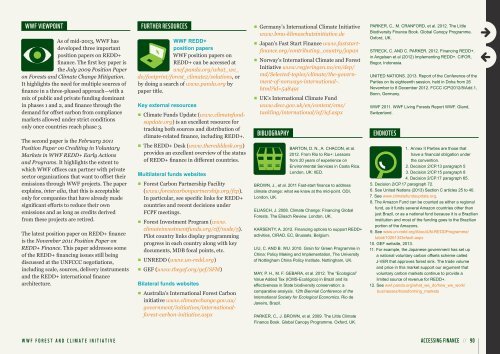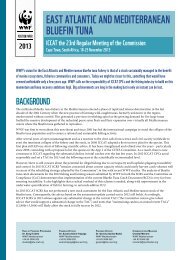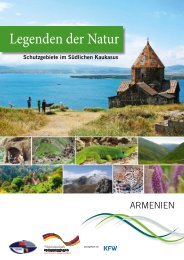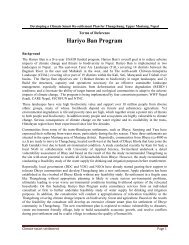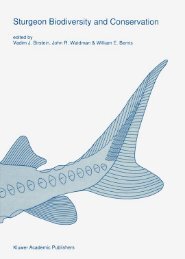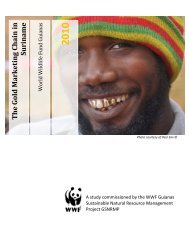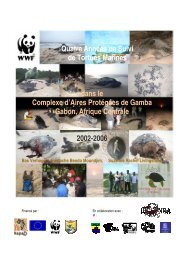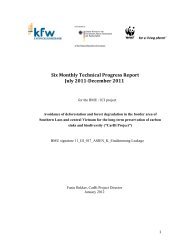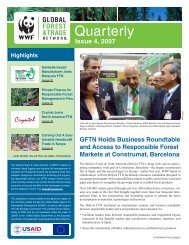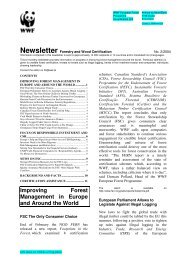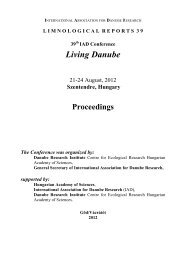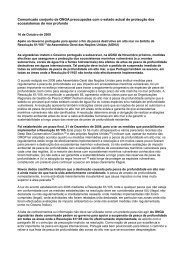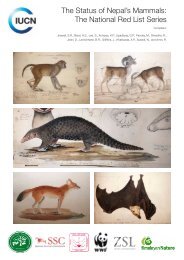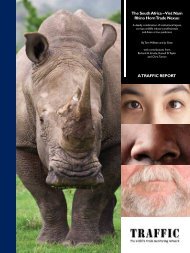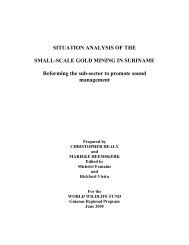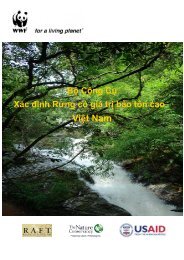WWF Guide to Building REDD+ Strategies
WWF Guide to Building REDD+ Strategies
WWF Guide to Building REDD+ Strategies
You also want an ePaper? Increase the reach of your titles
YUMPU automatically turns print PDFs into web optimized ePapers that Google loves.
<strong>WWF</strong> vieWPoint<br />
As of mid-2013, <strong>WWF</strong> has<br />
developed three important<br />
position papers on <strong>REDD+</strong><br />
finance. The first key paper is<br />
the July 2009 Position Paper<br />
on Forests and Climate Change Mitigation.<br />
It highlights the need for multiple sources of<br />
finance in a three-phased approach—with a<br />
mix of public and private funding dominant<br />
in phases 1 and 2, and finance through the<br />
demand for offset carbon from compliance<br />
markets allowed under strict conditions<br />
only once countries reach phase 3.<br />
The second paper is the February 2011<br />
Position Paper on Crediting in Voluntary<br />
Markets in <strong>WWF</strong> <strong>REDD+</strong> Early Actions<br />
and Programs. It highlights the extent <strong>to</strong><br />
which <strong>WWF</strong> offices can partner with private<br />
sec<strong>to</strong>r organizations that want <strong>to</strong> offset their<br />
emissions through <strong>WWF</strong> projects. The paper<br />
explains, inter alia, that this is acceptable<br />
only for companies that have already made<br />
significant efforts <strong>to</strong> reduce their own<br />
emissions and as long as credits derived<br />
from these projects are retired.<br />
The latest position paper on <strong>REDD+</strong> finance<br />
is the November 2011 Position Paper on<br />
<strong>REDD+</strong> Finance. This paper addresses some<br />
of the <strong>REDD+</strong> financing issues still being<br />
discussed at the UNFCCC negotiations,<br />
including scale, sources, delivery instruments<br />
and the <strong>REDD+</strong> international finance<br />
architecture.<br />
<strong>WWF</strong> FOREST AND CLIMATE INITIATIVE<br />
FuRtHeR ReSouRCeS<br />
<strong>WWF</strong> <strong>REDD+</strong><br />
position papers<br />
<strong>WWF</strong> position papers on<br />
<strong>REDD+</strong> can be accessed at<br />
wwf.panda.org/what_we_<br />
do/footprint/forest_climate2/solutions, or<br />
by doing a search of www.panda.org by<br />
paper title.<br />
Key external resources<br />
n Climate Funds Update (www.climatefundsupdate.org)<br />
is an excellent resource for<br />
tracking both sources and distribution of<br />
climate-related finance, including <strong>REDD+</strong>.<br />
n The <strong>REDD+</strong> Desk (www.theredddesk.org)<br />
provides an excellent overview of the status<br />
of <strong>REDD+</strong> finance in different countries.<br />
Multilateral funds websites<br />
n Forest Carbon Partnership Facility<br />
(www.forestcarbonpartnership.org/fcp).<br />
In particular, see specific links for <strong>REDD+</strong><br />
countries and recent decisions under<br />
FCPF meetings.<br />
n Forest Investment Program (www.<br />
climateinvestmentfunds.org/cif/node/5).<br />
Pilot country links display programming<br />
progress in each country along with key<br />
documents, MDB focal points, etc.<br />
n UNREDD (www.un-redd.org)<br />
n GEF (www.thegef.org/gef/SFM)<br />
Bilateral funds websites<br />
n Australia’s International Forest Carbon<br />
initiative www.climatechange.gov.au/<br />
government/initiatives/internationalforest-carbon-initiative.aspx<br />
n Germany’s International Climate Initiative<br />
www.bmu-klimaschutzinitiative.de<br />
n Japan’s Fast Start Finance www.faststartfinance.org/contributing_country/japan<br />
n Norway’s International Climate and Forest<br />
Initiative www.regjeringen.no/en/dep/<br />
md/Selected-<strong>to</strong>pics/climate/the-government-of-norways-international-.<br />
html?id=548491<br />
n UK’s International Climate Fund<br />
www.decc.gov.uk/en/content/cms/<br />
tackling/international/icf/icf.aspx<br />
BiBlioGRaPHy<br />
BARTON, D. N., A. CHACON, et al.<br />
2012. From Rio <strong>to</strong> Rio+: Lessons<br />
from 20 years of experience on<br />
Environmental Services in Costa Rica.<br />
London, UK: IIED.<br />
BROWN, J., et al. 2011 Fast-start finance <strong>to</strong> address<br />
climate change: what we know at the mid-point. ODI,<br />
London, UK.<br />
ELIASCH, J. 2008. Climate Change: Financing Global<br />
Forests. The Eliasch Review. London, UK.<br />
KARSENTy, A. 2012. Financing options <strong>to</strong> support <strong>REDD+</strong><br />
activities, CIRAD, EC, Brussels, Belgium.<br />
LIU, C. AND B. WU. 2010. Grain for Green Programme in<br />
China: Policy Making and Implementation, The University<br />
of Nottingham China Policy Institute. Nottingham, UK.<br />
MAy, P. H., M. F. GEBARA, et al. 2012. The “Ecological”<br />
Value Added Tax (ICMS-Ecológico) in Brazil and its<br />
effectiveness in State biodiversity conservation: a<br />
comparative analysis. 12th Biennial Conference of the<br />
International Society for Ecological Economics. Rio de<br />
Janeiro, Brazil.<br />
PARKER, C., J. BROWN, et al. 2009. The Little Climate<br />
Finance Book. Global Canopy Programme. Oxford, UK.<br />
PARKER, C., M. CRANFORD, et al. 2012. The Little<br />
Biodiversity Finance Book. Global Canopy Programme.<br />
Oxford, UK.<br />
STRECK, C. AND C. PARKER. 2012. Financing <strong>REDD+</strong>.<br />
in Angelsen et al (2012) Implementing <strong>REDD+</strong>. CIFOR,<br />
Bogor, Indonesia.<br />
UNITED NATIONS. 2013. Report of the Conference of the<br />
Parties on its eighteenth session, held in Doha from 26<br />
November <strong>to</strong> 8 December 2012. FCCC /CP/2012/8/Add.1,<br />
Bonn, Germany.<br />
<strong>WWF</strong> 2011. <strong>WWF</strong> Living Forests Report <strong>WWF</strong>. Gland,<br />
Switzerland.<br />
endnoteS<br />
1. Annex II Parties are those that<br />
have a financial obligation under<br />
the convention.<br />
2. Decision 2/CP.13 paragraph 5<br />
3. Decision 2/CP.15 paragraph 8<br />
4. Decision 2/CP.17 paragraph 65.<br />
5. Decision 2/CP.17 paragraph 72.<br />
6. See United Nations (2013) Section C articles 25 <strong>to</strong> 40.<br />
7. See www.climatefundsupdate.org.<br />
8. The Amazon Fund can be counted as either a regional<br />
fund, as it funds several Amazon countries other than<br />
just Brazil, or as a national fund because it is a Brazilian<br />
institution and most of the funding goes <strong>to</strong> the Brazilian<br />
portion of the Amazons.<br />
9. See www.un-redd.org/AboutUN-REDDProgramme/<br />
tabid/102613/Default.aspx<br />
10. GEF website, 2013.<br />
11. For example, the Japanese government has set up<br />
a national voluntary carbon offsets scheme called<br />
J-VER that approves forest sink. The trade volume<br />
and price in this market support our argument that<br />
voluntary carbon markets continue <strong>to</strong> provide a<br />
limited source of revenue for <strong>REDD+</strong>.<br />
12. See wwf.panda.org/what_we_do/how_we_work/<br />
businesses/transforming_markets<br />
aCCeSSinG FinanCe // 90


